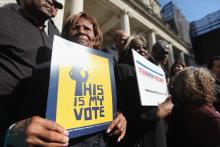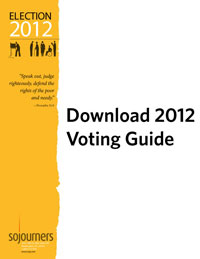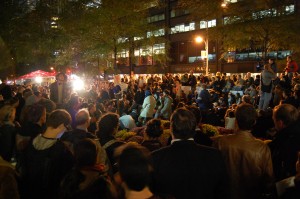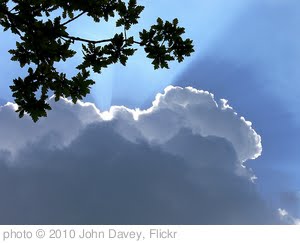Vote
IN THIS YEAR'S midterm elections, hundreds of thousands of Americans will have a much more difficult time casting their ballots than they did two years ago. And it won’t be because of rain, or early winter snows, or other acts of God.
It will be because powerful people don’t want them to vote.
Why? They stand to gain politically if the “wrong” people can be kept away from the polls. It’s the opposite of a “get out the vote” campaign—“keep out the vote” describes it better.
The tradition of keeping particular sectors of the population from taking part in the franchise goes back to the founding fathers. John Adams, for instance, believed that only rich, successful, smart people should vote—and only people of a certain race and gender, of course.
“Such is the frailty of the human heart,” Adams wrote in May 1776, “that very few men who have no property have any judgment of their own.” At the time, politicians in Massachusetts wanted to allow men who didn’t own property to vote. Adams thought that was a bad idea. For him, no property meant no vote.

I met my wife, Joy Carroll, at Greenbelt, a summer festival of faith, arts, and justice held annually in England. It was August 1994. A few months earlier, in May, Joy was one of the first women to be ordained as a priest in the Church of England. We were both speakers on a panel one day at Greenbelt, in a tent with 5,000 young people. Afterwards, we met for coffee. Joy had been an ordained deacon in the church for six years and was a leader in the movement to recognize all the gifts women had to offer both to the church and the parishes they served. She was the youngest member of the General Synod that decided to ordain women, and she was there for the historic vote in Church House Westminster in London. That cup of coffee eventually led to our marriage in 1997.
I have a vivid memory of returning to Greenbelt as speakers in 2002 with our almost 4-year-old son Luke. It was Sunday morning, and Joy was up on the worship platform celebrating the Eucharist for 20,000 people. My little boy was sitting on my lap watching his mom lead worship up on the stage. Luke looked up at me and said, “Daddy, can men do that too?”

In only its second week in session, Congress is already confronted with difficult decisions that impact the lives of millions of people — some of whom are the most vulnerable in our society.
The Senate is faced with finding a solution that would extend the unemployment insurance to help a struggling workforce. One of the solutions, proposed by Senator Ayotte (R-NH), would penalize U.S. citizen children who are part of already struggling immigrant households living in poverty. While it’s important that Congress finds a resolution to the unemployment insurance conundrum, they should not do so by shifting the harm from one group to the next.
On Wednesday, July 10th, when most eyes were on the private GOP meeting where republicans gathered in the Capitol basement to strategize on immigration reform in the House, advocates were rallying outside House buildings to urge members to enact immigration reform.
Uncertain of what the next steps are in the House, hundreds of activists, families, and faith leaders all gathered proudly and united in front of the Cannon and Longworth House Office Buildings as they chanted loudly, “Si se puede!”
Not discouraged by the hot summer heat, marchers hoped to catch GOP members as they ended their internal meeting and walked back to their offices.

I’m tired of reading blogs from my White Christian brothers about why they are choosing to vote. There. I said it.
I’m all for being a part of the democratic process, but it seems a bit odd to me that so many of these bloggers are coming from a position of power and privilege they themselves have always had. It seems a bit arrogant to choose something that was always theirs.
The way I see it, they had better vote. The vote of the White male is what finally allowed people like me – a woman, an immigrant, a non-native English speaker – to have the right to vote. I didn’t have a voice. I didn’t matter. Neither did my ancestors, who immigrated here under quota systems developed by people in power for the benefit of the country and the powers-that-be.
And there still are people who have no voice, who have no right to vote, but they are directly impacted by the politicians, referenda, judges, and local officials as well as the “agendas and policies.” As a Christian who is new to the process, its a privilege and responsibility I don’t take lightly because it isn’t a given. I’m not American born. We are not post-racial America, and the fact of the matter is the church isn’t either. We are working on it, but we aren’t there.
Did you know that in 1882 Congress passed the Chinese Exclusion Act denying citizenship and voting rights to Chinese Americans? Yup, they could build the railroads but they can’t vote.

As the winds and the rain of Hurricane Sandy settle down, one bit of the aftermath is going to be another round of conversation about how climate change is affecting our world.
It’s not a conversation you have heard much of in the presidential campaign this year. Climate change is one of a quartet of issues that will have a huge impact on the future of this nation that have gotten short shrift by both President Barack Obama and Gov. Mitt Romney.
Poverty. Guns. . Drones. Climate change.
Bring up any of those issues and watch the candidates make a quick nod of concern and then scamper away from any specifics. Yet those issues will be with us long after Nov. 6, so it is incumbent on those of us in the faith community to be laying the groundwork now for how we will address them in the coming year.
That work has already begun, of course. The challenge is not to let the post-election exhaustion sweep away those concerns like they were potted palms on a pier in the midst of the hurricane.

The 15th Amendment to the United States Constitution was the third in a triad of amendments crafted to protect the rights of recently emancipated African Americans. The 13th Amendment abolished slavery. The 14th Amendment granted citizenship to people who were once enslaved, regardless of race. The 15th Amendment, which was passed by Congress February 26, 1869 and ratified February 3, 1870, reads:
Section 1.
The right of citizens of the United States to vote shall not be denied or abridged by the United States or by any State on account of race, color, or previous condition of servitude —
Section 2.
The Congress shall have the power to enforce this article by appropriate legislation.
It took nearly a century of blood, terror, and tears, but in 1965 President Lyndon B Johnson and the 89th U.S. Congress passed the Voting Rights Act of 1965; legislation to enforce the 15th Amendment. Finally.
One year more than a decade later, in 1976, I walked hand-in-hand with my mother trudging up and down city blocks lined with row houses in our West Oak Lane neighborhood of Philadelphia. Each time we knocked and a neighbor came to the door, my mom, who served as the judge of elections for our neighborhood, asked: “Are you registered to vote?” If they weren’t, out came the clipboard.
I didn’t understand the legacy we were a part of that day, but with each sweep of the clipboard we were brandishing a non-violent weapon in the long fight of our ancestors to be and stay free. For 100 years — that’s five generations — they faced down the terror of burning crosses, threats to life and livelihood, and the elaborate labyrinth of Jim Crow voting laws — all set up to suppress their votes, all set up to crush their ability to exercise dominion.
So, when the Supreme Court announced recently that one of the cases it would take up in this session was a challenge to Section 5 of the Voting Rights Act, the hairs rose on the back of my neck.
 If you care about having a substantive conversation about issues that matter, you should share this post.
If you care about having a substantive conversation about issues that matter, you should share this post.
At its best, Christian faith provides a moral compass for advancing the common good. At worst, Christianity can be hijacked by partisan political agendas that divide and destroy. Sojourners encourages you to develop a robust and well-informed conscience around elections, measuring candidates and their platforms against Christian ethics and values. While we must be careful about translating scripture directly into public policy positions, there are principles and suggested approaches on a range of issues that can provide a critical framework to shape our perspective on public policy.
As we have since 2004, Sojourners has published an issues guide of principles and policies for Christian voters. We encourage you to use this guide to educate yourself on these issues. This can inform you as you write letters to candidates or to your local newspaper, call radio talk shows, and ask candidates at forums or town hall meetings questions based on these principles. Think and pray about whom, you would entrust with the responsibility to lead your community, state, and nation.
Share this with others and get ready for the conversation to begin.

I’m Catholic. My father comes from a working class Irish Catholic family; my mom is from a large Catholic family of German and Lithuanian decent. My brothers, sister, and I all attended Catholic school and growing up we attended Friday fish fries during Lent and church polka fests in the summer. I’m an active member of a Catholic church in St. Paul. And soon, my wife and I will celebrate the baptism of our daughter into the Catholic Church.
I’m also voting no on the anti-marriage and voter restriction amendments.
Some have asked how I can embrace a faith whose leadership has taken such a hard line against gay and lesbian equality, and which is painfully quiet on the threat to limit voting rights. I understand why people ask this question. For me, my decision to vote no is not in spite of my Catholic faith, it’s because of it.
When I was 10 my parents divorced. A couple years later my mom came out to my family as lesbian. By then she no longer felt welcome at church and stopped going to mass, though she has remained a deeply spiritual person. This one case of social exclusion is deeply meaningful to me, but is nothing compared to political decision by church leadership to spend millions of dollars to limit the freedom to marry in Minnesota. By doing so church leaders seek to permanently exclude gays and lesbians from the civil rights and benefits straight couples enjoy.
But here’s the thing: I’m still getting my daughter baptized. And I’m still Catholic. And I’m still voting no on both amendments in November.

Editor's Note: This is the second article in Lisa Sharon Harper’s election season blog series, Watch the Vote. Read the first HERE.
A few folks got a brilliant idea and brought a bunch of organizations together to declare September 25, 2012 as the first ever National Voter Registration Day! Aka, for the Twitterverse, #925NVRD. Woot, woot!
Maybe, like me, you’ve moved since the last election. Or maybe you’ve just turned 18. Or maybe, somehow, you managed to sleep through the last two elections. Don’t know how you did it, and I’m not judging, but brother, son, sister, daughter, today is the day to get right with the Lord. In times like these no one can afford to sit back and watch this one like a reality show on Bravo TV. Exercise your dominion; register to vote today!

For a lot of voters, President Barack Obama’s tenure hasn’t turned out quite as they hoped. On the other side, the presumptive GOP nominee, Gov. Mitt Romney, isn’t the candidate that many voters seem ready to believe in.
Traditional political parties are in decline. In December 2011, Gallup reported that 45 percent of the U.S. population identified as politically independent. At the same time, the direction of our two parties is more and more influenced by political movements like the Tea Party and Occupy Wall Street.
While there is an unprecedented level of money flowing into elections from wealthy donors, corporations and unions, social media has democratized access to fellow voters. You can spend millions of dollars buying airtime on traditional TV stations—but it is entirely possible to craft a compelling message that will reach millions for a relatively small cost.
A politically disillusioned electorate and a huge influx of money for attack ads will be a challenge to our country’s democratic processes. The danger, especially for my generation, is to tune out from political and civic engagement entirely.
The opportunity is post-candidate politics.

FOX NewsChannel host Sean Hannity calls the Rev. Jesse Lee Peterson, "the most courageous, outspoken critic of the liberal left and the so-called 'black leadership' in America today."
He also calls him pastor.
Peterson, 62, is president and founder of The Brotherhood Organization of A New Destiny (BOND) — an organization dedicated to promoting the conservative agenda in the African American community. Host of his own radio and television programs, Peterson also is a member of Choose Black American, which stridently opposes illegal immigration in the United States and a former member of the California Christian Coalition.
Hannity has hosted Peterson as a guest on his Fox show numerous times and sits on the board of BOND, which he lauds for having, "played an instrumental role in helping young men and women build lives which will help inspire the next generation. BOND continues to fight the good fight standing for the values of God, family, and country, and are deserving of our support."
On March 5, Peterson took to the airways on his "Exploring Your Destiny with Jesse Lee Peterson" program and delivered a message/sermon titled, "How Most Women Are Building a Shameless Society." The video clip came to our attention Thursday afternoon, when Fox and Daily Beast contributor Kirsten Powers, a Democtrat who also happens to be an evangelical Christian, began posting a litany of tweets on Twitter castigating Peterson for his blatant misogyny.
Heads up, students!
Under the guise of taking steps to protect against “voter fraud,” some lawmakers may be making it more difficult for you to vote.
If you’re a young person with a transient living situation, and especially if you’re an out-of-state college student who wishes to vote in the state where you attend school, it’s time to start paying close attention to your state’s election requirements and laws.
Efforts are already underway across the country to make it more difficult to vote, and if you’re not prepared, you may find yourself without an electoral voice come next November.
Approximately 37 states either have or are in the process of changing eligibility requirements for the 2012 election, and a recent report from the New York University School of Law’s Brennan Center predicts that they could affect up to 5 million voters from traditionally Democratic districts, affecting as many as 171 electoral votes.

Less than one percent of the federal budget goes to foreign aid. Our spending on development and foreign assistance is not -- by any stretch of the facts or imagination -- our national debt.
Cutting foreign aid programs will do little to get us out of debt, but would be a devastating setback in the fight against global, extreme poverty.
People of faith -- including evangelical Christians -- will be voting both ways in the upcoming election. It is simply not true that they will be voting only on one or two issues.
And, if evangelicals focus on many of the issues central to their faith, rather than becoming partisan cheerleaders, they might be able to raise some critical issues in this election and to hold both sides more accountable, even in a campaign that both Richard and I suspect will be one of the ugliest in U.S. history.
At the end of the evening, Amy remarked that if the upcoming election debates were as civil and substantive as this evening was, we would all be very grateful.
 Throughout the day here at the #OccupyWallStreet mass demonstrations in New York's financial district, you can find small and often somber groups meeting.
Throughout the day here at the #OccupyWallStreet mass demonstrations in New York's financial district, you can find small and often somber groups meeting.
They have agendas, a facilitator, a time keeper, and someone to keep track of the "stack" -- the list of people waiting to make a point or ask a question.
And they also have a system of hand gestures -- a sort of gonzo sign-language adaptation of Roberts Rules of Order -- designed to keep the discussion and decision-making process both democratic and efficient.
When someone agrees with a point the speaker is making, the crowd raises two hands in agreement. When the crowd disagrees, hands quickly go up, making a downward pointing motion. To call a "point of process" crowd members shape their hands into a triangle to stop discussion. Speakers who wander off topic are quickly redirected and reminded of the point being discussed in the agenda.
These working groups bring their recommendations to the #OccupyWallStreet General Assembly, which takes place once a day. A vote is taken to determine consensus before a recommendation is passed along to the G.A.
Anyone participating in the General Assembly can block a proposal by forming an X with their arms. Participants make their case and then a revised proposal is put forth. The revised proposal can then be passed with a 90/10 consensus.
Rick Perry was recently asked by a nine-year-old "If you were a super hero, what kind of super hero would you be?" His answer to the child's benign question was simultaneously predictable and profound: Superman.
 Here's a little round up of links from around the Web you may have missed this week:
Here's a little round up of links from around the Web you may have missed this week:
- Sandwich coasters are fun.
- Guy lets the world use his Starbucks card for free.
- Voters put corn kernels into jars with their favorite Republican presidential candidates.
 Here's a little round up of links from around the Web you may have missed this week:
Here's a little round up of links from around the Web you may have missed this week:
- Our prayers extend to the people of Norway. Lord, have mercy.
- Why voter ID laws will disenfranchise women. (HT: Kristof)
- The New York Times said it best. Today's weather "felt more like being licked by a big, swampy monster."
- Who wrote what? Rep. West vs. Jane Austen.
- These awesome folks turned Carmageddon into a dinner party.